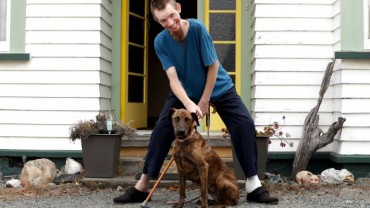'No choice but to keep going': Kiwi struggles to get help as his tissue turns to bone

Time is of the essence for a Nelson man with a rare genetic condition that causes his tissue to turn to bone.
Dylan Barker was four years old when he was diagnosed with the extremely rare condition fibrodysplasia ossificans progressiva (FOP).
As he ages, his muscles, tendons and ligaments calcify into bone which constrains his movement.
Hope lies with a drug that can halt the bone growth, but despite being eligible for it in Australia, for the past year the 29-year-old and his family have been battling to access the drug in New Zealand.
For the last five or so years Dylan has had a chair to help him get around. He can still walk, although by his own admission, "it's not fast or very pretty".
But maintaining a range of motion is important, as when it goes he knows it won't return.
"Once things lock up that's it, I don't get the movement back.
"I'm doing pretty good to be walking for this long as slow and painful as it is."
His ankles are fused, he does not have movement in his spine and his jaw is locked.
Barker misses being able take a bite of an apple or feel the texture of a Crunchie bar. Watching others yawn or sneeze is frustrating, he can remember what that felt like.
Dr Frederick Kaplan, the leading world-expert on FOP, who diagnosed Barker as a child, said as at January 2018, there were 37 universities researching the condition and 12 pharmaceutical companies actively developing drugs for FOP.
Barker was granted compassionate access to one of those drugs, palovarotene, in Australia last March. Since then, Barker and his family have been jumping through hoops to try to get the drug into New Zealand.
Carer Miyuki Duggan said she had been working for more than a year to help Barker access the drug and it felt like everything she tried to do for him involved a fight.
"It will be life-changing. They said it stops 75 per cent of flare ups and bone growth which is massive for him," Duggan said.
"However trying to get it into the country has been very problematic, this drug he has been offered for free, but trying to go through the bureaucracy of it all has been awful."
It had been one thing after another. At first, they couldn't afford the GST on the value of the drug which they were told meant they couldn't bring it into the country.
"You name it, it was an obstacle, but we are not giving up."
Throughout that time, Barker had been in a near-constant state of flare up.
"It's frustrating, we just seem to be going around in circles, ever decreasing circles" he said.
They had received support from Rare Disorders New Zealand Chief executive Lisa Foster and remained hopeful they would be able to gain access to the medication.
Foster had been dealing with the drug manufacturer, doctors, pharmacists, Customs and the IRD to work out what the hold up was.
She said the doctor had been reluctant to prescribe it, as he was concerned about the cost of GST on his practice. It was agreed that the pharmacist would receive the medication once Barker had a prescription, but that hadn't happened either.
Foster said the situation was "deplorable".
"This is the way that it is for so many people with rare disorders in so many different ways. Everything is overly complicated, there is no clear pathway, there is no advice or navigation, help or support."
"Dylan really needed quick access to that medication on a compassionate basis and it certainly hasn't happened."
There were 300,000 New Zealanders living with a rare disorder and Foster said during a recent survey, the resounding feedback was that they felt invisible.